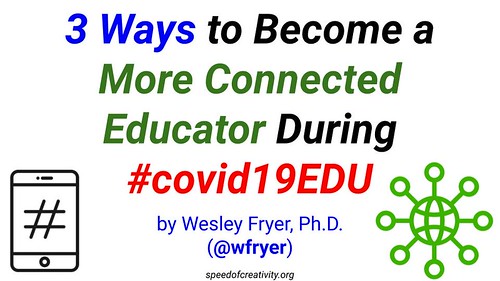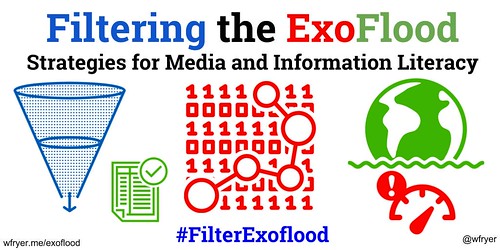The neo-Coronavius / COVID-19 crisis is upon us in the United States. As we grapple as teachers with how to maintain wellness and self-care for ourselves, our families, and our students, it’s important to consider how we can each become more connected to our educator colleagues around the world for support and idea sharing. In this post, I’ll highlight three powerful ways we can each become more digitally connected during this crisis, while still maintaining healthy boundaries and screentime limits.
Suggestion 1: Connect to Other Educators on Twitter
We have been living in a digitally connected world for awhile, but many teachers are still not using Twitter for educational networking. Everyone has heard negative news headlines about Twitter, but that’s far from “the rest of the story” when it comes to Twitter and teacher collaboration! Please consider my own testimony: “Twitter is the most powerful networking technology I have ever used and experienced as a professional educator for 25 years, which makes me a better teacher and learner every single week of the year.” If you are an educator and not on Twitter, THIS IS THE TIME to start using it for professional networking with others! If you are already on Twitter, now is the time to connect with new people and learn to extend your use of the platform even further.
Twitter can be intimidating and even overwhelming at times, but thankfully there are great online resources and people to help you get started. Here are a few, after you setup your account with a unique, complex password. Remember to try and choose a relatively SHORT Twitter ID / handle, and include a few details in your PROFILE so other educators will be able to identify you as a potential colleague.
- Use Twitter lists to follow other educators on Twitter. Here are links to my Twitter lists for Education Yodas (that’s the list I’d start with), Media Literacy, and Digital Citizenship. Click MEMBERS on each one and choose some people to follow, looking at their profiles and recent tweets to decide if you want to learn more from what they share. I maintain more Twitter lists but those will get you started.
- Check out Karly Moura (@KarlyMoura) and Sean Fahey (@SEANJFAHEY)’s outstanding free resource, “A Beginner’s Guide to Twitter for Educators.” It’s linked from Ditch That Textbook, which is an excellent resource by Matt Miller (@jmattmiller).
- Follow some hashtags of professional interest. Currently I’m following #covid19EDU as an unofficial but helpful educational hashtag for educators, organizations, and other folks sharing resources related to the coronavirus crisis and resources for schools / teachers / parents / students. Find out if your state has an educational hashtag. (We do in Oklahoma, it’s #OklaEd). I also like to follow #MediaLit and #MediaLiteracy. There are many more educational hashtags. Explore a few of them to find other PEOPLE you want to connect with and learn from.
Suggestion 2: Join Educator Support Live Events Online
Remote learning / home learning and teaching online / at a distance is challenging! To maintain our own wellness as teachers, spouses, parents, children to older parents, or whatever other hats we wear, we need support from colleagues! This can be more challenging when we don’t see other teachers in the hallway at school each weekday! The good news is, there are THOUSANDS of other educators “out there” online collaborating via Twitter, Facebook Groups (like Seesaw Teachers), and on other platforms. Live, online events can be a powerful way to connect with other teachers for support and ideas in this challenging time.
The Media Education Lab (@MedEduLab) of Dr. Renee Hobbs (@reneehobbs) is one organization offering regular, daily evening online gatherings (“Virtually Viral Hangouts”) starting this week each day from 1-2 pm Eastern / 12-1 pm Central / 11 am – noon Mountain / 10 – 11 am Pacific. I’m sure more online “hangouts” like this will be offered… Using Twitter and finding some other connected educators is a great way to learn about more. Consider offering your own weekly “live meetup” for other teachers at your school, if someone is not already. If you come up with a clever name for yours, please let me know with a reply on Twitter to @wfryer. Maybe something like, “Teacher Lounge Hangout Time?” I’m sure someone else can think of a catchier title… but this idea and opportunity is both solid and needed!
Suggestion 3: Use Flipboard to Filter Your Information Feeds
The World Heath Organization (WHO) reported on February 2, 2020, we are experiencing “a coronavirus infodemic.” This is a HUGE media literacy challenge for everyone, including educators.
“The 2019-nCoV outbreak and response has been accompanied by a massive ‘infodemic’ — an over-abundance of information — some accurate and some not — that makes it hard for people to find trustworthy sources and reliable guidance when they need it.”
WHO Novel Coronavirus(2019-nCoV) Situation Report 13 for 2 Feb 2020
Amidst so much information and disinformation, it’s critical we learn and practice more sophisticated media literacy skills. We need to both model and teach these to our students as well as colleagues and parents. Flipboard (@flipboard) is a powerful, free app and online platform for “curating your own feeds of information.” It’s a customizable digital magazine, which unlike Facebook, you can directly tweak and manage to provide content YOU trust and want to read / see / watch. See my workshop curriculum, “Discovering Useful Ideas,” for more suggestions about how you can use Flipboard as well as other online resources in a more deliberately curated “information feed.” Also check out the resources from my workshop, “Filtering the ExoFlood: Strategies for Media and Information Literacy.” We all need to “step up our game” when it comes to finding and sharing trustworthy sources of information online!
I hope these resources are helpful to you! I want to encourage you to give some of these suggestions a try, and share them with your colleagues! We do face a challenging global pandemic in the neo-Coronavius / COVID-19 crisis, but we have more powerful tools at our fingertips than ever before to use to collaborate, connect, support, and learn together.
If you enjoyed this post and found it useful, subscribe to Wes’ free newsletter. Check out Wes’ video tutorial library, “Playing with Media.” Information about more ways to learn with Dr. Wesley Fryer are available on wesfryer.com/after.
On this day..
- Lessons Gleaned from the Life of Joseph Priestley – 2017
- Don’t Use an AT&T Phone Overseas Without an International Calling Plan – 2016
- Inspired by the First All-Female USAF Boeing E-3 Sentry Air Crew – 2013
- Student “Confession Pages” Trend Highlights Free Speech Issues & Need to Address Ethics / Digital Citizenship – 2013
- Playing With Media Trailer: Modeling Technology Use as the Superintendent – 2012
- Global Collaboration (including The Arab Spring Project) at Yarmouth High School – 2012
- Microsoft Copying Apple Store Experience – 2011
- Feedburner Feed and Yahoo Pipe Updated (no longer frozen on Feb 18th post) – 2011
- Terms of Service Agreements Users Don’t Read – 2011
- Install alternate operating systems and software on a netbook via a USB flash drive – 2010


